|
|
|
Sort Order |
|
|
|
Items / Page
|
|
|
|
|
|
|
| Srl | Item |
| 1 |
ID:
179522
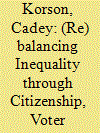

|
|
|
|
|
| Summary/Abstract |
Since 1988, New Caledonia, a sui generis French territory in the Pacific, has experienced increasing autonomy in preparation for a vote on full sovereignty. Beginning in 2018, a series of up to three referenda will determine the future of this archipelago. Although New Caledonians have benefited from ongoing association with France and indigenous Kanak have garnered greater political representation, significant inequalities among ethnic communities persist. Pro-independence Kanak nationalists push for greater political control through a frozen referendum electorate to rebalance indigenous power lost during colonization. At the same time, anti-independence loyalists resent some of the special rights gained by the Kanak because of the decolonization process. The ability and right to express self-determination by voting on the upcoming referendum on sovereignty and defining a new citizenship is intimately tied to issues of inequality and the independence debate. Building on the conceptual framework associated with islandian sovereignty, this paper examines how the rebalancing discourse is a product of internal inequalities that challenge the benefits of subnational island jurisdiction (SNIJ) status. A closer examination of political narratives surrounding the sovereignty debate offers insight into how New Caledonian politicians are using electoral categories, voter eligibility and citizenship to rebalance inequalities.
|
|
|
|
|
|
|
|
|
|
|
|
|
|
|
|
| 2 |
ID:
192630
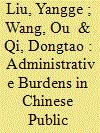

|
|
|
|
|
| Summary/Abstract |
The non-take-up of public services has the potential to undermine civil rights and deepen social inequality. Looking at the case of the Youth Community College Programme in China, an innovation in governance to facilitate community integration of the migrant population by providing free education, this study finds that the targeted disadvantaged groups are systematically excluded due to the disproportionate imposition of various administrative burdens on them. We propose that an interaction mechanism – which we term “selective affinity” – between the policy process and individuals’ human capital leads to this unintended outcome. The study contributes to a deeper understanding of the causal mechanisms underlying vulnerable people's non-take-up of public services, while highlighting an example of dysfunctional state–society interaction and a mechanism for the reproduction of social inequality under authoritarianism in China.
|
|
|
|
|
|
|
|
|
|
|
|
|
|
|
|
| 3 |
ID:
148242
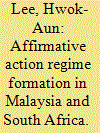

|
|
|
|
|
| Summary/Abstract |
This paper examines the formation of majority-favouring affirmative action (AA) regimes in Malaysia and South Africa. Malaysia’s Constitution premises AA on a group’s special position; South Africa’s refers to unfair discrimination. Malaysia established AA amid continuation of a political order and consolidation of executive power, while South Africa democratized and transitioned from minority to majority rule. Minority groups held less economic power in Malaysia than in South Africa. Consequently, AA in Malaysia is characterized by discretionary decision-making, and quota-based, centralized programmes, whereas South Africa has followed a legislative route involving negotiation and enforcement of target-based, statutory requirements, under less centralized oversight.
|
|
|
|
|
|
|
|
|
|
|
|
|
|
|
|
| 4 |
ID:
114859
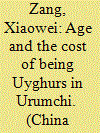

|
|
|
|
|
| Publication |
2012.
|
| Summary/Abstract |
This article asks: is the cost of being Uyghurs higher for young Uyghurs than for old Uyghurs in Ürümchi? I address this question with data from a survey of 2,947 people conducted in Ürümchi in 2005. The cost of being Uyghurs refers to the extent of economic inequality in the earnings of Han Chinese and Uyghurs. I develop three hypotheses on the effect of age on earnings differentials between Han Chinese and Uyghurs. Data analyses show that although young Uyghurs are better educated and earn more than old Uyghurs, they are more likely than old Uyghurs to suffer from being Uyghurs in Ürümchi. This finding has policy implications for the reduction of ethnic disparity in Xinjiang.
|
|
|
|
|
|
|
|
|
|
|
|
|
|
|
|
| 5 |
ID:
180176
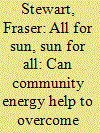

|
|
|
|
|
| Summary/Abstract |
Can community energy help to overcome inequalities in who benefits from low-carbon technologies? Research has shown that the distribution of low-carbon technology subsidies and their associated benefits can be highly uneven across socioeconomic groups, revealing a persistent inequality issue. Yet this research has tended to focus almost exclusively on adoption of technologies at the household-level, with limited insights into whether and how this distribution might differ in the case of community energy. To address this, this paper quantitatively investigates the distribution of payments to household- and community-level energy systems across socioeconomic groups in Scotland under the UK government feed-in-tariff. Analysis is conducted on a novel dataset of 26,218 household and community wind and solar installations across 6,976 micro-level data-zones using a combination of distributional analysis and random effects within-between regression. It finds that feed-in-tariff payments for household-level wind and solar PV systems have heavily benefitted more affluent socioeconomic groups, while payments to community energy projects have flowed more consistently into areas of higher deprivation, particularly in the case of community solar. These findings suggest that community energy has been successful in bringing the benefits of low-carbon technologies to areas of lower income and higher deprivation, with important lessons for policymakers concerned with a just transition going forward.
|
|
|
|
|
|
|
|
|
|
|
|
|
|
|
|
| 6 |
ID:
188682
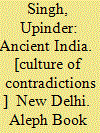

|
|
|
|
|
| Publication |
New Delhi, Aleph Book Company, 2021.
|
| Description |
xv, 263hbk
|
| Standard Number |
9789390652617
|
|
|
|
|
|
|
|
|
|
|
|
Copies: C:1/I:0,R:0,Q:0
Circulation
| Accession# | Call# | Current Location | Status | Policy | Location |
| 060302 | 934.01/SIN 060302 | Main | On Shelf | General | |
|
|
|
|
| 7 |
ID:
132093
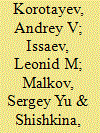

|
|
|
| 8 |
ID:
068946
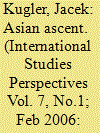

|
|
|
| 9 |
ID:
192341
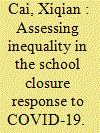

|
|
|
|
|
| Summary/Abstract |
The spread of coronavirus disease 2019 (COVID-19) has caused school closures in most countries, affecting over 90% of the world's student population. School closures can widen learning inequalities and disproportionately hurt vulnerable students. We collected data on the exam scores of university applicants in China before and after a two-month period of school closure. We observe that students from rural, lower-income households are more negatively affected by school closures compared to their urban, higher-income counterparts. The inequality effect remains sizable in the admission exam three months after schools reopen. To strengthen the causal interpretation of the results, we investigate the scores in the previous graduating cohorts who did not experience school closure, and find no evidence of the change in scores over the same calendar period. Our study points to the urgent need to address the educational inequality caused by school closures.
|
|
|
|
|
|
|
|
|
|
|
|
|
|
|
|
| 10 |
ID:
169213
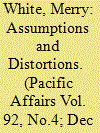

|
|
|
|
|
| Summary/Abstract |
Ronald Dore’s work on education in Japan centred on themes of selection and equality. In his work on Tokugawa education, Dore presaged some of the emphasis he gave in his later work on quality and social and moral content in modern education. The argument of The Diploma Disease concerned the “late development effect” as a tool in understanding the emphasis on qualification and selection that led to Japan’s postwar examination hypertrophy, and in understanding the distortions and inequities that ensued. “Late ascription”—tracking and determining one’s life chances with a single examination—was one such distortion, narrowing the gate to educational and occupational success, belying the notion that Japan demonstrates a pure “meritocracy.”
|
|
|
|
|
|
|
|
|
|
|
|
|
|
|
|
| 11 |
ID:
122814


|
|
|
|
|
| Publication |
2013.
|
| Summary/Abstract |
This article examines the impact of asymmetrical devolution on mass preferences for devolution and voting behavior in the regions of Spain. Rather than mitigating demands for greater devolution, asymmetry encourages the escalation of such demands in both the ethnically distinct and the majority-dominated regions. Preferences for symmetry and perceptions of inequality that result from asymmetry are transformed into pressures for further devolution via the electoral mechanism. These findings suggest asymmetrical devolution may be an unstable solution for managing ethnoregionalism, and that Stepan, Linz, and Yadav's strong endorsement of asymmetrical federalism as a tool for the management of ethnoregionalism in democracies should be qualified.
|
|
|
|
|
|
|
|
|
|
|
|
|
|
|
|
| 12 |
ID:
183036
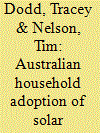

|
|
|
|
|
| Summary/Abstract |
Prior studies establish that electricity systems across the globe need to transition toward renewable energy and that renters have a low adoption of effective means to do so through access to household solar photovoltaics (PV). Yet, the economic, environmental, and social costs of low PV adoption by people who have trouble paying their electricity bills (hardship customers), who are more likely to be low-income tenants, remain understudied. Drawing on electricity use data from an Australian energy retailer we compare the performance of PV for hardship customers against ‘average’ households. Results illustrate that if society could achieve greater solar PV installation on hardship homes, annual grid-based electricity consumption could be reduced by 40%, lowering greenhouse gas emissions by 1.6 tCO2e per household annually and energy bills by $2908 per low-income household over 15 years. We illustrate how Australian policy could be re-oriented to encourage greater PV adoption on hardship properties, including through support for a new market structure that distributes the economic benefits of PV between renters and landlords.
|
|
|
|
|
|
|
|
|
|
|
|
|
|
|
|
| 13 |
ID:
131493


|
|
|
|
|
| Publication |
2014.
|
| Summary/Abstract |
Human osteological data provide a rich, still-to-be-mined source of information about the distribution of nutrition and, by extension, the distribution of political power and economic wealth in societies of long ago. On the basis of data we have collected and analyzed on societies ranging from foraging communities to the ancient Egyptian and modern European monarchies, we find that the shift from hunting and gathering to complex fishing techniques and to labor-intensive agriculture opened up inequalities that had discernible effects on human health and stature. But we also find that political institutions intervened decisively in the distribution of resources within societies. Political institutions appear to be shaped not only by economic factors but also by military technology and vulnerability to invasion.
|
|
|
|
|
|
|
|
|
|
|
|
|
|
|
|
| 14 |
ID:
179321
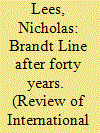

|
|
|
|
|
| Summary/Abstract |
The Brandt Line is a way of visualising the world that highlights the disparities and inequalities between the wealthy North and the poorer Global South. Forty years after its popularisation as part of a call for global reform, is the Brandt Line now a misleading way of representing world politics? This article assesses whether the Global South has lost its distinctiveness and coherence relative to the North since 1980. Existing assessments of global inequality do not settle the question of whether the North–South divide remains relevant for international relations because they overlook the most politically significant measures of inequality. Drawing on power transition theory, this article provides a systematic assessment of the North–South divide in terms of levels of economic development, relative inequality, economic power, and political satisfaction. The evidence suggests that the Brandt Line is largely intact. Although the economic diversity of the South has increased and its collective economic power has risen, relative income rankings remain unaltered and the states of the Global South are as dissatisfied as they were four decades ago. Differential growth rates are reshaping world politics without eroding the North–South divide traced by the Brandt Line.
|
|
|
|
|
|
|
|
|
|
|
|
|
|
|
|
| 15 |
ID:
097827


|
|
|
| 16 |
ID:
150998
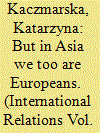

|
|
|
|
|
| Summary/Abstract |
The standard of civilisation served Western states to hierarchically organise international politics and reproduce Western pre-eminence. Russia, depending on the historical period, has been interpreted as either an ardent follower or a major challenger to Western projects, but it has been markedly absent from debates regarding the standard. This article proposes to engage Russia in the standard of civilisation discussion with reference to the standard’s two most considered expositions: the colonial-era ‘original’ and what the literature interprets as the standard’s contemporary revival. In order to do so, I trace Russia’s nineteenth-century colonial practices and analyse Russia’s selected policies towards post-Soviet states in the post–Cold War period. On the basis of these explorations, I argue that Russia’s application of the standard of civilisation goes beyond the mere reproduction of hierarchical arrangements between an imagined centre and peripheries. The practices of the standard of civilisation have been employed to improve Russia’s desired, and imagined, status in international politics – that of a great power equal to the West. From that it follows that the concept of the standard of civilisation should be recognised as ordering relations not only of the strong and the weak but also of those in position of power in international politics.
|
|
|
|
|
|
|
|
|
|
|
|
|
|
|
|
| 17 |
ID:
081861
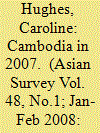

|
|
|
|
|
| Publication |
2008.
|
| Summary/Abstract |
This year saw continued economic growth but increasing discontent over inequality and dispossession. Mindful of upcoming elections, Prime Minister Hun Sen declared a "war on land-grabbing," with little practical effect. Infighting within the political opposition consolidated the government's electoral prospects, while the protests of the poor were forcibly suppressed.
|
|
|
|
|
|
|
|
|
|
|
|
|
|
|
|
| 18 |
ID:
164555
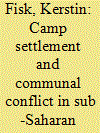

|
|
|
|
|
| Summary/Abstract |
Are areas that host encamped refugees more likely to experience communal conflict, and under what conditions? Building on insights from the refugee studies literature suggesting that settling refugees in camps can intensify intercommunal tension in host communities, this article investigates the effect of refugee encampment on the occurrence of communal conflict at the subnational level in sub-Saharan Africa. It first tests for a general relationship between the overall presence and population intensity of encamped refugees and communal conflict before assessing whether this relationship is moderated by local-level characteristics, including interethnic linkages and political and economic marginalization within the host region. The basic findings show that communal conflict occurs more frequently in regions where refugees are camp-settled. Tests for interactive effects indicate that refugee camps have a significant marginal effect on conflict only if they are located in areas with politically marginalized host groups. Origin country/host region ethnic ties are shown to exert significant moderating effects. Moreover, results from an extended set of analyses show that the form of refugee settlement matters, as the presence and population intensity of self-settled refugees are related to decreases in the occurrence of communal conflict.
|
|
|
|
|
|
|
|
|
|
|
|
|
|
|
|
| 19 |
ID:
117970
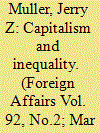

|
|
|
|
|
| Publication |
2013.
|
| Summary/Abstract |
Inequality is rising across the post-industrial capitalist world. The problem is not caused by politics and politics will never be able to eliminate it. But simply ignoring it could generate a populist backlash. Governments must accept that today as ever, inequality and insecurity are the inevitable results of market operations. Their challenge is to find ways of shielding citizens from capitalism's adverse consequences -- even as they preserve the dynamism that produces capitalism's vast economic and cultural benefits in the first place.
|
|
|
|
|
|
|
|
|
|
|
|
|
|
|
|
| 20 |
ID:
109418
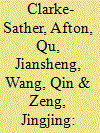

|
|
|
|
|
| Publication |
2011.
|
| Summary/Abstract |
This study asks whether sub-national inequalities in carbon dioxide (CO2) emissions mirror international patterns in carbon inequality using the case study of China. Several studies have examined global-level carbon inequality; however, such approaches have not been used on a sub-national scale. This study examines inter-provincial inequality in CO2 emissions within China using common measures of inequality (coefficient of variation, Gini Index, Theil Index) to analyze provincial-level data derived from the IPCC reference approach for the years 1997-2007. It decomposes CO2 emissions inequality into its inter-regional and intra-regional components. Patterns of per capita CO2 emissions inequality in China appear superficially similar to, though slightly lower than, per capita income inequality. However, decomposing these inequalities reveals different patterns. While inter-provincial income inequality is highly regional in character, inter-provincial CO2 emissions inequality is primarily intra-regional. While apparently similar, global patterns in CO2 emissions are not mirrored at the sub-national scale.
|
|
|
|
|
|
|
|
|
|
|
|
|
|
|
|
|
|
|
|
|